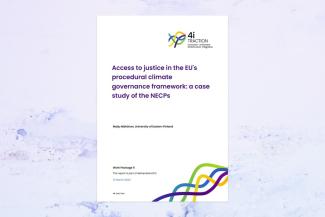
Mähönen, Maiju (2024): Access to Justice in the EU's Procedural Climate Governance Framework: A Case Study of NECPs’, D5.2: 4i-TRACTION case study report. University of Eastern Finland
Access to justice in the EU's procedural climate governance framework: a case study of the NECPs
This case study investigates access to justice concerning national energy and climate plans.
To successfully address the climate crisis, adherence to the EU’s procedural climate governance framework is crucial. The planning obligations in the Governance Regulation are key to meeting the targets laid down in the European Climate Law. However, neither the Governance Regulation nor the European Climate Law includes provisions for judicial oversight in case of non-compliance.
Against this background, this report investigates access to justice concerning national energy and climate plans (NECPs), which require EU Member States to outline their strategies to meet the 2030 energy and climate targets. In turn, the European Commission must review the NECPs and issue recommendations if they show insufficient progress or ambition.
The report explores currently available avenues for access to justice with view to challenging NECPs, focusing on litigation before national courts and the internal review procedure under the Aarhus Regulation. It also acknowledges the role of infringement proceedings and the Aarhus Convention Compliance Committee. The findings confirm that while wide access to justice for environmental NGOs in particular is in principle provided under the Aarhus Convention and CJEU case law, several barriers to access to justice remain.
Following, the report discusses whether legislative harmonisation appears needed to improve access to justice and whether the upcoming revision of the Governance Regulation could play a role in this regard. It concludes that regarding the Commission’s compliance, much will depend on how the revised Aarhus Regulation is applied. Although the internal review procedure should be accessible regarding the Commission’s role in the NECP process, the extent to which it’s acts or omissions may be subject to judicial review in this connection remains uncertain.
At the Member State level, it was found that reliance on the Aarhus Convention and the case law of the CJEU alone does not ensure access to justice evenly across the Member States. Although it may be argued that access to justice regarding NECPs should already be provided for, it is not guaranteed. The same applies to the possibility of requesting preliminary review to clarify how a particular provision of the Governance Regulation should be interpreted. Therefore, the report concludes that legislative action appears needed to ensure access to justice consistently throughout the EU.
In this respect, the report recommends an inclusion of an access to justice provision in the Governance Regulation. The feasibility of broader harmonisation of access to justice appears weak in the light of previous harmonisation attempts. While this so-called sectoral approach to access to justice has not yet succeeded in EU climate law, several examples of its application may be identified in EU environmental law. However, the existing examples mostly implement Article 9(2) the Aarhus Convention rather than Article 9(3) and are varied in style.
Therefore, identifying a particular model to be followed in the design of the potential access to justice provision of the Governance Regulation is challenging. One point of comparison could be the proposed access to justice provision regarding Air Quality plans under the Air Quality Directive, on which a provisional agreement was recently reached.
To align with the Aarhus Convention, the provision should allow review of both substantive and procedural legality of NECP-related acts or omissions. This also requires that the contested provisions are sufficiently clear and precise. However, the question on how extensively NECPs may be reviewed beyond procedural obligations is not simple and will be explored in future research.